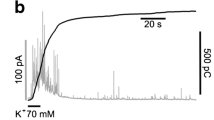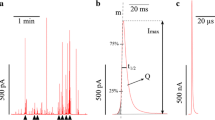Abstract
Chromaffin cells have been widely used to study neurosecretion since they exhibit similar calcium dependence of several exocytotic steps as synaptic terminals do, but having the enormous advantage of being neither as small or fast as neurons, nor as slow as endocrine cells. In the present study, secretion associated to experimental measurements of the exocytotic dynamics in human chromaffin cells of the adrenal gland was simulated by using a model that combines stochastic and deterministic approaches for short and longer depolarizing pulses, respectively. Experimental data were recorded from human chromaffin cells, obtained from healthy organ donors, using the perforated patch configuration of the patch-clamp technique. We have found that in human chromaffin cells, secretion would be mainly managed by small pools of non-equally fusion competent vesicles, slowly refilled over time. Fast secretion evoked by brief pulses can be predicted only when 75% of one of these pools (the “ready releasable pool” of vesicles, abbreviated as RRP) are co-localized to Ca2 + channels, indicating an immediately releasable pool in the range reported for isolated cells of bovine and rat (Álvarez and Marengo, J Neurochem 116:155–163, 2011). The need for spatial correlation and close proximity of vesicles to Ca2 + channels suggests that in human chromaffin cells there is a tight control of those releasable vesicles available for fast secretion.






Similar content being viewed by others
Explore related subjects
Discover the latest articles and news from researchers in related subjects, suggested using machine learning.References
Albillos, A., Dernick, G., Horstmann, H., Almers, W., de Toledo, G. A., & Lindau, M. (1997). The exocytotic event in chromaffin cells revealed by patch amperometry. Nature, 389, 509–512.
Allbritton, N. L., Meyer, T., & Stryer, L. (1992). Range of messenger action of calcium ion and inositol 1,4,5-triphosphate. Science, 258, 1812–1815 .
Álvarez, Y. D., & Marengo, F. (2011). The immediately releasable vesicle pool: Highly coupled secretion in chromaffin and other neuroendocrine cells. Journal of Neurochemistry, 116, 155–163.
Douglas, W. W., & Rubin, P. (1963). The mechanism of catecholamine release from the adrenal medulla and the role of calcium in stimulus-secretion coupling. Journal of Physiology, 167, 288–310.
Fenwick, E. M., Marty, A., & Neher, E. (1982). Sodium and calcium channels in bovine chromaffin cells. Journal of Physiology, 331, 599–635.
Gil, A., & González-Vélez, V. (2010). Exocytotic dynamics and calcium cooperativity effects in the calyx of held synapse: A modelling study. Journal of Computational Neuroscience, 28(1), 65–76.
Gil, A., Segura, J., Pertusa, J., & Soria, B. (2000). Monte carlo simulation of 3-d buffered Ca2 + diffusion in neuroendocrine cells. Biophysical Journal, 78(1), 13–33.
Gillis, K. D., Mössner, R., & Neher, E. (1996). Protein kinase c enhances exocytosis from chromaffin cells by increasing the size of the readily releasable pool of secretory granules. Neuron, 16, 1209–1220.
González-Vélez, V., & Godínez-Fernández, J. (2004). Simulation of five intracellular Ca2 + -regulation mechanisms in response to voltage-clamp pulses. Computers in Biology and Medicine, 34(4), 279–292.
Heinemann, C., Chow, R., Neher, E., & Zucker, R. (1994). Kinetics of the secretory response in bovine chromaffin cells following flash photolysis of caged Ca 2 + . Biophysical Journal, 67, 2546–2557.
Horrigan, F. T., & Bookman, R. J. (1994). Releasable pools and the kinetics of exocytosis in rat adrenal chromaffin cells. Neuron, 13, 119–1129.
Klingauf, J., & Neher, E. (1997). Modeling buffered Ca2 + diffusion near the membrane: Implications for secretion in neuroendocrine cells. Biophysical Journal, 72, 674–690.
López-Font, I., Torregrosa-Hetland, C., Villanueva, J., & Gutiérrez, L. (2010). t-SNARE cluster organization and dynamics in chromaffin cells. Journal of Neurochemistry, 114, 1550–1556.
Marengo, F. D. (2005). Calcium gradients and exocytosis in bovine adrenal chromaffin cells. Cell Calcium, 38, 87–99.
Marengo, F. D., & Monck, J. (2000). Development and dissipation of Ca2 + gradients in adrenal chromaffin cells. Biophysical Journal, 79, 1800–1820.
Moser, T., & Neher, E. (1997). Rapid exocytosis in single chromaffin cells recorded from mouse adrenal slices. Journal of Neuroscience, 17(7), 2314–2323.
Neher, E. (2006). A comparison between exocytotic control mechanisms in adrenal chromaffin cells and a glutamatergic synapse. Pflügers Archiv–European Journal of Physiology, 453, 261–268.
Parsons, T. D., Coorssen, J., Horstmann, H., & Almers, W. (1995). Docked granules, the exocytotic burst, and the need for atp hydrolisis in endocrine cells. Neuron, 15, 1085–1096.
Pérez-Álvarez, A., & Albillos, A. (2007). Key role of the nicotinic receptor in neurotransmitter exocytosis in human chromaffin cells. Journal of Neurochemistry, 103, 2281–2290.
Segura, J., Gil, A., & Soria, B. (2000). Modeling study of exocytosis in neuroendocrine cells: Influence of the geometrical parameters. Biophysical Journal, 79, 1771–1786.
Villanueva, J., Torregrosa-Hetland, C. J., Gil, A., González-Vélez, V., Segura, J., Viniegra, S., et al. (2010). The organization of the secretory machinery in neuroendocrine chromaffin cells as a major factor in modeling exocytosis. HFSP Journal, 4(2), 85–92.
Voets, T. (2000). Dissection of three Ca2 + -dependent steps leading to secretion in chromaffin cells from mouse adrenal slices. Neuron, 29, 537–545.
Voets, T., Neher, E., & Moser, T. (1999). Mechanisms underlying phasic and sustained secretion in chromaffin cells from mouse adrenal slices. Neuron, 23, 607–615.
Acknowledgements
The authors thank Prof. Luis Miguel Gutiérrez (Instituto de Neurociencias, Alicante) for useful comments. AG, VGV and JS acknowledge I-MATH (project C3-0136) financial support. VGV acknowledges financial support from CONACyT-México. AHV holds a fellowship award from the Universidad Autónoma de Madrid. This work was supported by a grant from the Ministerio de Ciencia y Tecnología No. BFU2008-01382/BFI and BFU2011-27690 awarded to AA.
Author information
Authors and Affiliations
Corresponding author
Additional information
Action Editor: Erik De Schutter
Electronic Supplementary Material
Below is the link to the electronic supplementary material.
Rights and permissions
About this article
Cite this article
Albillos, A., Gil, A., González-Vélez, V. et al. Exocytotic dynamics in human chromaffin cells: experiments and modeling. J Comput Neurosci 34, 27–37 (2013). https://doi.org/10.1007/s10827-012-0404-x
Received:
Revised:
Accepted:
Published:
Issue Date:
DOI: https://doi.org/10.1007/s10827-012-0404-x




